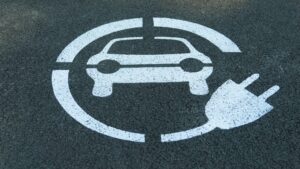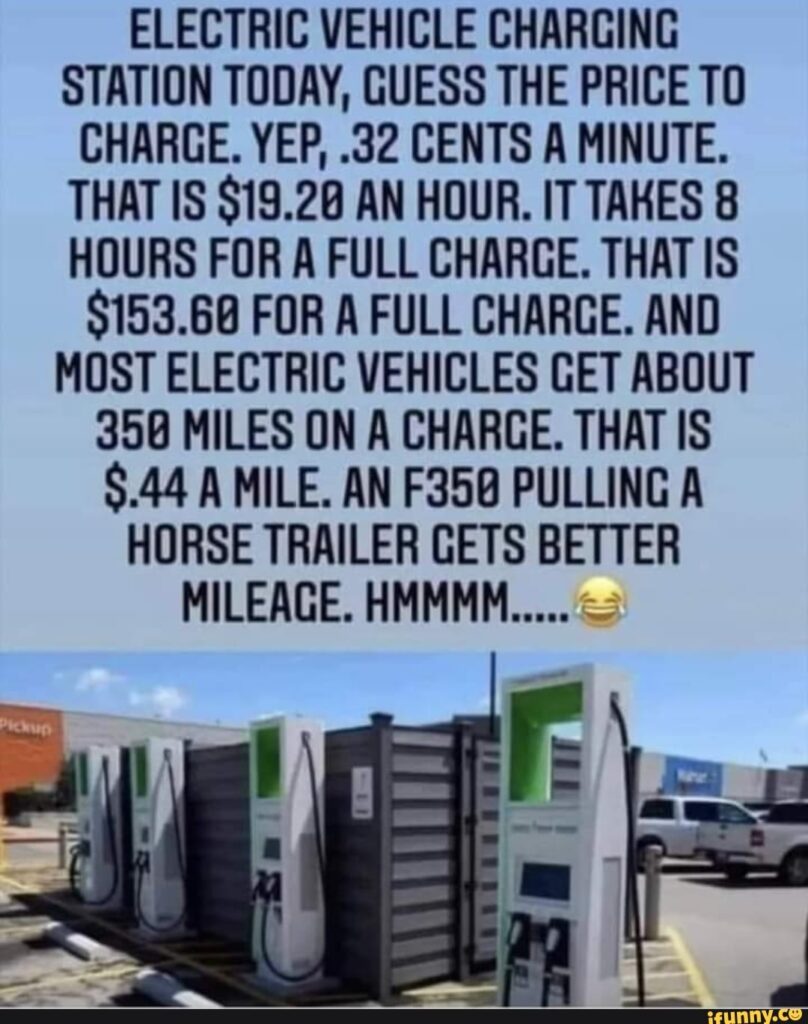
You’re driving your new EV across country and it’s time to charge. You pull up to the charging station and plug in. How long is it going to take you to charge? If you look in any EV forum you will see this come up because the anti-EV crowd uses it to say why you shouldn’t buy an EV. Is it really a problem? This is more complex than a simple yes or no answer, so let’s dig in to what the variables are.
How Does Your EV Impact How Long it Takes to Charge?
The first variable you need to understand is what the maximum speed charge it will accept. For the purpose of this discussion I’ll use the charge ratings that is disclosed on vehicle specifications. Refer to the following vehicle specifications for example:
| Vehicle Type | Range | Maximum Charge Rate | DC Charge Time (10-80%) |
| Kia EV6 RWD | 310 Miles | 240 kw | 18 minutes |
| Ford Mustang Mach-E X RWD | 303 Miles | 150 kw | 45 minutes |
| Volkswagen ID.4 | 265 Miles | 125 kw | 38 minutes |
| Hyundai Kona Electric | 258 Miles | 77kw | 54 minutes |
As you can see, there is a pretty wide spread of speeds that electric vehicles can charge at. Generally speaking, the higher the maximum rate, the faster that the vehicle will charge. The size of the battery also has an impact when considering charging speed; if a vehicle has a smaller charge speed it can potentially charge faster even with a slower charge speed.
What is the Maximum Speed of the EV Charger?
The next piece of information to understand how long your EV will take to charge is the speed of the charger. Not all chargers are created equal and they will provide different results when you connect to them. For instance, Harley-Davidson dealerships have DC Fast chargers that only charge at up to 25 KW. This is because they are deployed to help charge their LiveWire electric motorcycles that have much smaller batteries. Tesla Supercharger v2 will support up to 250 KW speeds. Electrify America chargers support up to 350 KW, though they also have 150 KW chargers at their stations.
So it’s important to understand the maximum speed of your vehicle and pair it with the maximum speed of the charger that best matches. If you are driving a Mach-E that can accept 150 KW at most, then use a 150 KW charger. Likewise, an EV6 that accepts up to 240 KW, use the 350 KW charger to get the shortest charging sesion.
The Charge Curve Effects How Long it Takes to Charge
Now that you have the charge speed of your car and understand the relationship you might think you have all you need to understand charge speed. However, a critical piece to understand is the charge curve. In an ideal world, when you plugged your EV in it would change at a constant speed of the highest rate possible. That’s not the cast though. As a result of battery chemistries and how well they accept charge at certain levels as well as battery management systems trying to maintain the health of the battery the speed can go up and down during a charge. Typically, this means that a charge may start out fast but as more charge is added to the battery the charge rate may decrease substantially. This is one of the reasons that most manufacturers recommend only charging to 80% on DC Fast Chargers. The state of charge that your car is at can change how fast the electricity is delivered to your EV.
If you’re wondering what the charge curve is for your car, a quick image search for charge curve with your vehicle name will bring up images to check it out!
Other Things that Impact Your EV Charge
We’ve covered the charge speed of your car, the speed of the charger and the charge curve can impact the speed of charge. Common things that could slow down charging include:
- Extreme Heat – If the outside temperature is extreme, the battery management system may slow down charging in order to keep the battery from getting too hot. Once The battery cools down, you could see the speeds bounce back up.
- Extreme Cold – When the battery is too cold the charging speeds can decrease as well. As with extreme heat, the battery management system will slow down charging to protect the battery. Many newer EVs have battery warmers that enable the EV to pre-condition the battery and warm it up to lessen the impact of cold on your charging session though.
- Charging Station Issues – Sometimes charging stations can have issues that don’t prevent it from delivering a charge, but prevent it from delivering at full speed. In these cases it’s best to contact the charging station owner and let them know the situation. Sometimes a simple reboot of the station can help with the charging speed.
Applying Our Knowledge
Let’s take what we have just covered and apply it to a meme that has been circulating around the internet lately.

This meme does provide some correct information. In some locations, the Electrify America network pricing does charge $0.32/minute as their top tier rate for faster charging vehicles. In Texas, that tier starts for any vehicle that can accept more than 90 KW. That rate applies whether the vehicle achieved that rate or not. But that is about where the truth stops.
The meme then goes on to say that it takes 8 hours for a full charge. If you are charging on a level 2 charger that may be the case, however the pricing and the photo included here are Electrify America DC Fast chargers. If we take the EV6 charge time of 18 minutes and use the $0.32/KWh pricing we end up with $5.76. Using 217 miles for the range of the EV6 (70% of 310), that equates to $0.0265/mile. While we don’t know what his F350 pulling a trailer gets for fuel efficiency, we do know from the “How Much Will My Electric Bill Go Up” post that an average fuel efficiency car costs about $184 to go 1189 miles. Some simple math tells us that’s $0.154 per mile and that’s without hauling a trailer. That costs almost six times more per mile with the gas car!
